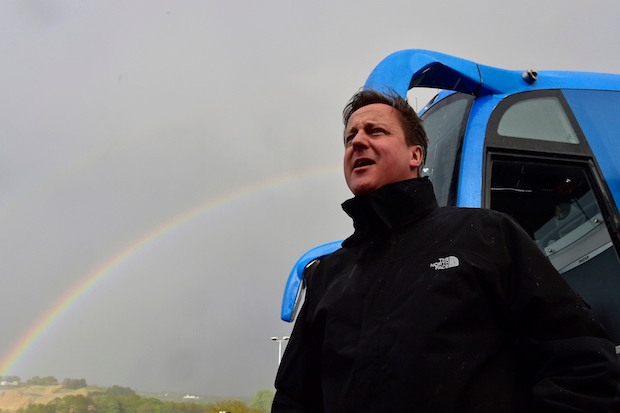1. Neck and neck
Before the election campaign kicked off properly at the end of March, a poll of polls put Labour on 34 per cent and the Tories on 33 per cent. Six weeks of vigorous campaigning later and barely anything has changed. Yesterday, Survation put Labour on 34 per cent and the Tories on 33 per cent. Two other polls yesterday also showed the race is too close to call: Populus puts the Conservatives and Labour tied 34 per cent apiece, while ComRes puts the Tories two points ahead on 35 per cent and Labour on 32 per cent. Lord Ashcroft also has the Tories two points ahead on 35 per cent. Some pollsters believe that the campaign often makes very little difference to voting intentions and is in fact, a very expensive ‘get out the vote’ operation. When the short campaign began, Tories had hoped they would be able to pick up a few points in the final weeks and the shy Tory vote would push them comfortably into the lead. Unless there are some big surprises in the final polls out today, it really all does look as if Labour and the Tories are tied. Interestingly, Ukip’s vote appears to have recovered somewhat, stabilising around 12-13 per cent according to most pollsters, while the Liberal Democrats are beginning to push back into single digits. Even if it’s not a good night for the main parties, tomorrow could suggest we have truly entered the era of four party elections.2. Message in a soundbite
David Cameron and Ed Miliband have honed their core messages throughout the campaign and we can expect to hear nothing new today. David Cameron will tell voters in the north that Britain is ‘on the road to a brighter future’ while Ed Miliband will be pledging in the south of England ‘a government that will put working people first’. Nick Clegg on the other hand continue to offer ‘stability and decency’ as the Liberal Democrat leader continues on his epic 1,000 mile journey from Land’s End to John O’Groats. The aim of today is to reinforce those messages, as well as reminding voters of the importance of tomorrow’s vote and ensure that folks do actually turn out to the polling stations.3. Blurred red lines
As the polls above suggest, no one is on course for victory. Anyone who tells you they know what is going to happen is taking a stab in the dark or a little foolish. Unsurprisingly given the state of play, the first red lines for coalition negotiations are starting to be aired. Ed Miliband revealed yesterday that revoking non-dom status is non negotiable for any Labour-led government:‘Let me be clear: any government I lead after this election will abolish the non-dom rule’
Nick Clegg has said he wouldn’t form a coalition with any party who does not command a majority in the House of Commons, but said that an EU referendum would not be a red line for his party — vital for any future Tory-led government. Cameron hasn’t hinted at what he would want in a future coalition but has instead focused on arguments of legitimacy — warning that Miliband is ‘very dangerous’ and is is attempting to use a ‘con trick’ to make it into Downing Street. The Telegraph reveals this morning at if Cameron has the larges number of seats, he will declare victory on Friday morning and attempt to out manoeuvre Labour on any coalition deals. This time in 48 hours, we’ll see if he manages to do just that.






Comments